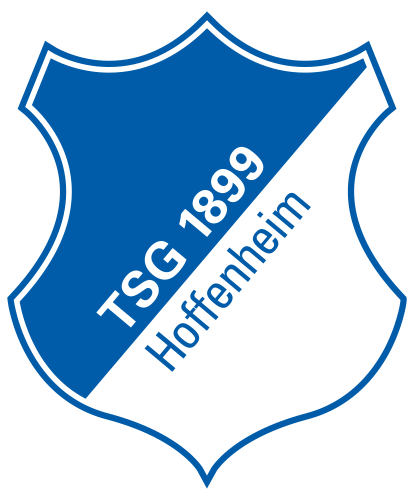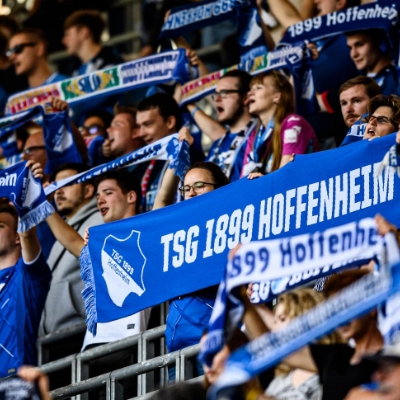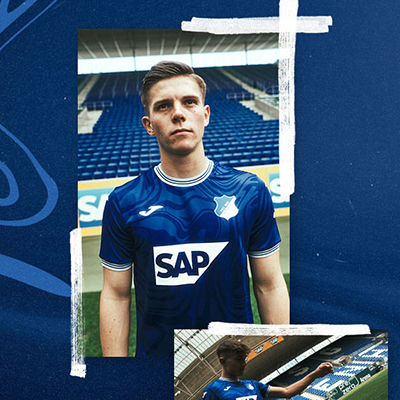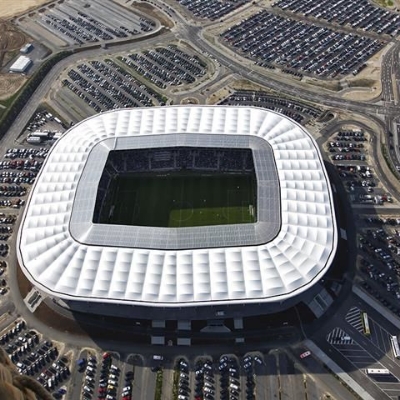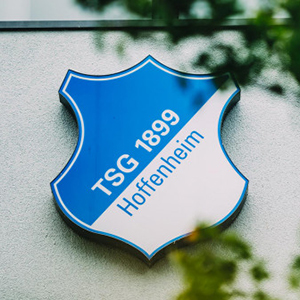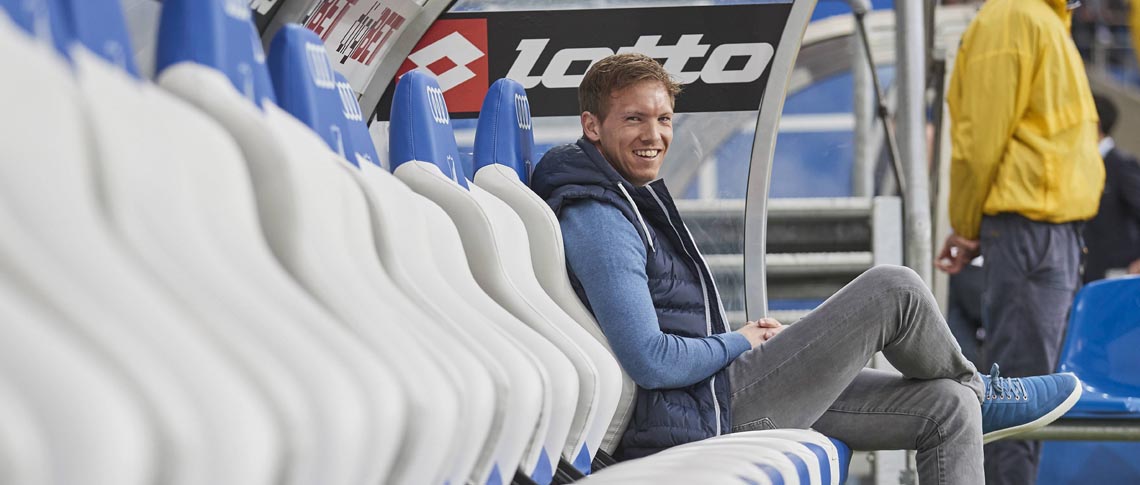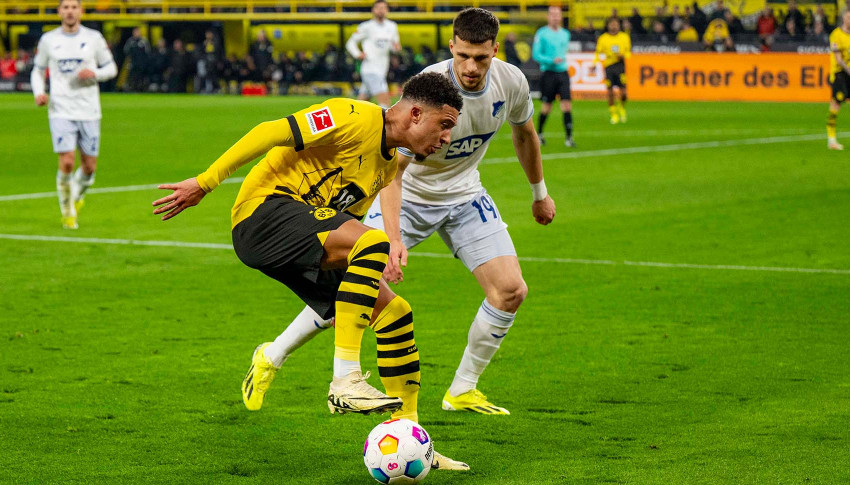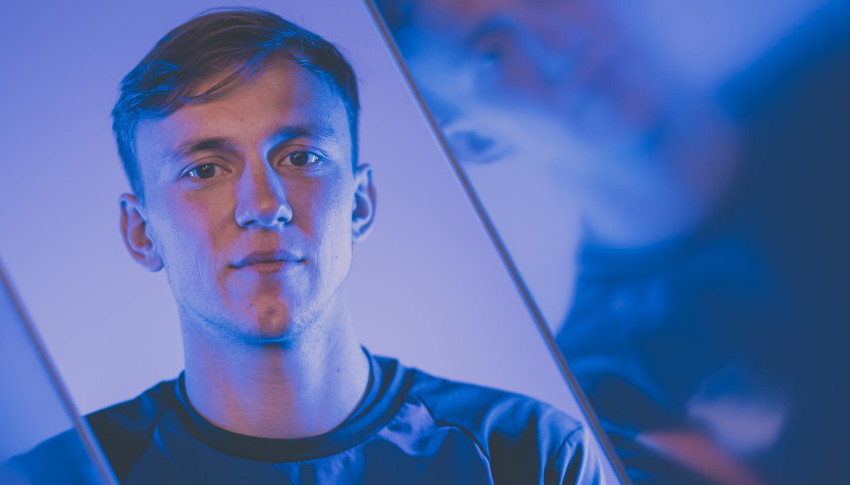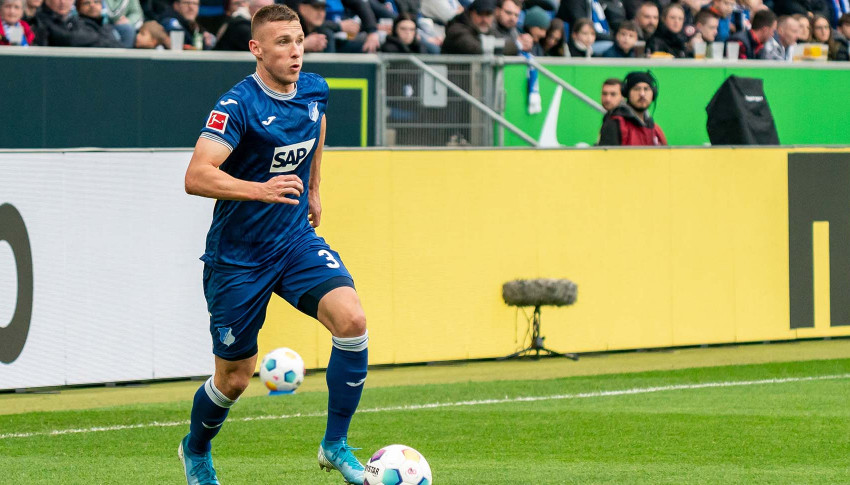Julian Nagelsmann’s plans
It’s now time to enjoy the summer break after a long and intense season, but the manager doesn’t really have time to rest given the opening of the transfer window and the plans that need to be made for the upcoming season. Still, do you look forward to the time off from football and spending time with your family?
Julian Nagelsmann: I’ve had to cancel my holiday four or five times over years past years, but that’s not the case this year. I’m abroad in Europe for the first couple of weeks, and then I’ll be in the Alps again, but we’ll I’ll come back here now and again to have talks with players. I want to get to know new signings in a one-on-one interview before they sign a contract, and for them to get to know me of course. Sitting across from one another is totally different from just a phone conversation. I’d never sign a player before a one-on-one meeting.
What’s the difference from signing players to the academy?
Nagelsmann: Everything moves along quicker there because the biggest topic is their education and you have to ensure that they’re able to transfer schools. The biggest issue with professionals tends to be the money, which is why it takes so long. Acquiring a license for them to play in the league and competitions is also an issue. I’m an advocate of moving the transfer period away from the summer, because it’s just so hard for a manager. Players have a maximum of one meeting if an agent doesn’t represent them, but normally the players just hear the figures and say yes or no for the most part. However, for managers it’s tough because of the lack of holiday. It’s nothing dramatic for me, but you do have to explain to the kids that you’ll be away for another five days even though it’s the summer – but I can’t change the transfer period.
Have you noticed if players are now more interested in the opportunity to train under you than was the case last year?
Nagelsmann: The players we’ve wanted over the last few years have decided to join us. I never got the impression that they we’re skeptical, and it’s the same now: The manager can tip the scales. If the compensation received from two clubs is of a similar level, then it always comes down to the manager as the deciding factor. However, this year things are a little more complicated because of where we finished, so the club is in more talks with players and the financial stakes have been raised. We won’t make any massive moves in spite of the fact we’re competing at an international level, because we’re happy with the players we’ve got in the starting line-up. They’ve got a special chemistry with one another, and you run the risk of upsetting the balance of the team by introducing new signings. People don’t just go through life without saying anything, and there’s potential for trouble when a few players are earning a lot more than the others.
So you have to always have to manage and make decisions that will go down well with the group?
Nagelsmann: Alex (Alexander Rosen, director of first team football) handles the salaries – I have very little to do with that. I don’t know how much my players earn at all, and I don’t want to know, because it can have an effect on how you value your players.
Do you clench your fists when you hear about the numbers? As a manager you do have to be somewhat of an idealist and take the next steps forward in terms of what you achieve on the pitch.
Nagelsmann: I’m a realist and as a realist you have to understand that you only have a limited window within which to make money in this line of work, so it’s understandable should a player make ten million in five years with club X, compared to only five million with club Y. People always forget that it’s a job and that they’re there to make money, as once you get to a certain age it’s not so easy to make money. Most players don’t really have an education and haven’t really studied. It was somewhat easier to get a job in your early thirties 20 years ago than it is now.
Are you happy with your plans for the squad so far or is there still work to be done?
Nagelsmann: There’s still work to be done. We’ve got Florian Grillitsch from Bremen and we’re close to acquiring two more players, but we’re just waiting on their current clubs. Another disadvantage of a late transfer window is that you still don’t exactly know who’s going where. I’m a big fan of having around five or six new players because new faces do the club good. New players are eager to learn, absorb new knowledge, and keep the group hungry for more. It’s always good for a herd to bring in fresh blood – that’s the case with nature, and that’s the case on the football field.
That worked fantastically for you last season, as the new players pulled their weight. Did you plan for Kevin Vogt to run the defence?
Nagelsmann: We had originally planned for him to play as a defensive-midfielder, because originally we wanted to play 4-3-3. You don’t need that many players when you’ve got professionals who can play in multiple positions, and that was kind of the idea when we brought him in. You need a bit of luck when it comes to new signings too, and thankfully that was the case with Kevin. During the meetings with new players we also discuss whether they’d be open to learning a few new things and perhaps open to playing a new position.
So the three-back formation with Vogt and Hübner wasn’t plan A?
Nagelsmann: No, it wasn’t plan A. Hübner maybe thought he’d play here and there (laughs). He asked me at the start of the season whether I needed him or if he should go. I told him that it would take a bit of time given that we play a different style of football to FC Ingolstadt. You put yourself in a dodgy position as a manager when you tell a player that they’ll be an important starter in the sight, but it’s good when it works out for a player that you promise that to.
Was one of the keys to a successful season the fact that you managed to employ the three-back formation?
Nagelsmann: Definitely, but there are a few more experiences to go along with that like the 4-4 in Mainz. If we had lost 3-0 or 4-0, then the season would have gone differently. We were absolutely woeful in Mainz but had a chance to win the game by the end. That sparked something within the group. Additionally, the win against Bayern gave us a second wind, so there are lots of things that contributed to making us what we are today.
You’re in a position to qualify directly for the Champions League next season, and you’ll also be in the DFB-Pokal, so the team has to play well right from the get-go. Will the squad have to adapt during pre-season?
Nagelsmann: You can’t make pre-season too long, or else you run the risk of losing the enthusiasm of the players. We have to make sure that we’re ready to play when it comes to the Champions League qualifier and the Pokal. We’ll start training players individually a little earlier than we did last year, as well as beginning our tactical elements earlier. There’ll be a few extra sessions where we’ll go through the contents of these tactical sessions so that we’re ready to go when it comes to the first game.
Sebastian Rudy and Niklas Süle are leaving the club, but will it be easier than it was last year because the team has more depth and has good chemistry?
Nagelsmann: In regards to tactics, it’ll definitely be easier for us than it was last year. However, teams like Bayer Leverkusen and Schalke 04 will invest a lot of money to ensure that they don’t finish in a mid-table position again. As a result, it’ll be tough to repeat what we achieved last season.
The European games mean that there’ll be a lot of broken up training weeks in which the focus will be on recovery sessions. How will you go about dealing with this?
Nagelsmann: That’s already something I’m having to adjust to because I really like training with the team and studying the details in practice. We’ll have to work more with video footage – like virtual training. Recovering and running through tactics go hand in hand with one another, and it’ll be difficult for us to keep with the competition if all we do is recover and play games. It’s something that Bayern München might be able to do given the unbelievable quality their individuals possess, but we’re not quite at that level yet. We’ll have to see at the time how exactly it works out.
Do you believe that mental strength can be more important than tactics?
Nagelsmann: I find that excitement and preparation first arise in the head of the player. It’s important to go about business with the boys in the right way, to treat them right, and be empathetic. There are a lot of tough decisions that have to be made, so what’s most important is that you have a connection to the players and ensure that they are mentally prepared to develop themselves as players, and themselves want to do so. Boredom kills relationships, and when it’s boring the players will simply not be interested even if you offer them the best training session or are a tactical super-nerd. At that point the manager may as well pack his things up and go home.
Have you established your behavior around the team?
Nagelsmann: To greet the team with a few handshakes is the norm. I always recommend things, because I’m wary of being too critical at my age. They’re all over 18 and have to know themselves what the right thing to do is and what’s important. For example, we have specific times when we like to eat as a group, and it’s important to be punctual. I think that if you have a good gauge you can get more out of your players when you give them a guard-rail. I’m not one for picking out every detail, but you do have to have people like that around.
Did you feel that you had secured your job when you’ve seen scenes of celebration, like after the game against Mainz?
Nagelsmann: Scenes like that show that the group is in harmony. The saying ‘you have to be eleven friends’ certainly isn’t true, but egos and plain competitiveness don’t work either. You have to have good people on the pitch that will follow instructions. There also needs to be a mix of individualists, who want to stand out, and team-players, who want to work for their side. I think we’ve seen that in our team the combination of the two players works well.
So do you have a clear hierarchy of players, from players like Eugen Polanksi to Oliver Baumann?
Nagelsmann: Eugen tries to offer something in the form of his expertise. Kevin Vogt and Benni Hübner are also the types of players that will take players along with them for the ride, and help them learn – especially Benni on the field. Oli Baumann also knows what to say. So overall we have a few players who can and are keen to take on the role of responsibility.
What’s it like between opposing managers and yourself on the touchline? Have you been welcomed in to the circle of Bundesliga managers?
Nagelsmann: It was already clear to me that not every manager would welcome me with open arms because I became a Bundesliga manager at 28 years old. There are only a limited number of vacancies in the Bundesliga and when someone new comes onto the coaching carousel, they might feel threatened that someone they know has been thrown off of the carousel, so to speak. It’s very competitive as a result, but there are colleagues of mine like Ralph Hassenhüttl or Christian Streich who have been there for me to talk to, even five minutes before the game. I count myself as that kind of person too. I want to win at all costs, but I also still want to enjoy myself and have fun. If you look at us while we’re on the sideline, we still laugh a lot and get up to all sorts of nonsense, but there are also some who remain very stern and serious. Overall though, it was clear to me beforehand that not every manager would be there to welcome me when I march into their stadium.


